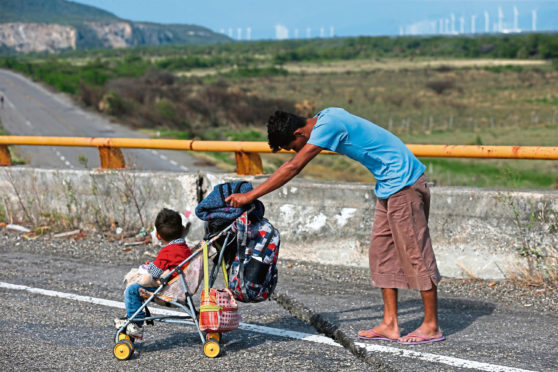We move as a species.
The first of us looked around Eastern Africa and thought, “I’m going somewhere else”. Humanity spread from our origin and eventually populated the entire landmass – at least the nicer bits.
Last to be populated was South America as it required humans going all the way to Siberia, then crossing over into North America and finally making it down to the Amazon and beyond.
Currently a caravan of people is making that journey in reverse, from south to north, and it’s such a potent threat to the US’s sense of safety it may swing the mid-term elections in Republicans’ favour.
There is something oddly convenient about this small parade of people heading for the US/Mexico border – almost as if it was set up by political strategists wanting to win votes off the back of people’s fear of immigrants.
That is the suspicion of the former United Nations human rights chief, Zeid Raad Al Hussein, who says the world is lurching alarmingly towards extremism, driven by the idea that immigrants are coming to get us.
The evidence for this in the UK comes from the retired head of counter-terrorism for the Metropolitan Police, Mark Rowley.
He says far-right terrorism is a growing threat. Four plots were disrupted in 2017, and he said “right-wing extremism is reaching into our communities through sophisticated propaganda”.
Much as we may move as a species, we don’t like outsiders. Thus a nation created by migrants, the US, can live in fear of them.
The Jews are cast as the perpetual migrants.
When forced out of other trades in medieval Europe some ended up in banking, only to then be castigated as running a banking conspiracy.
Whatever aspect of irrational prejudice drove Robert Bowers to shoot at worshippers in a Pittsburgh synagogue this week doesn’t really matter – he killed 11 people out of irrational fear.
Mr Rowley says of the UK’s far right group, National Action: “For the first time we have a home-grown proscribed white supremacist, neo-Nazi terror group, which seeks to plan attacks and build international networks.”
It’s the same fear, the same comfort sought in something pure about being white.
Former Chancellor George Osbourne has said he and former PM David Cameron mishandled the immigration question, and it proved “pretty lethal” to the Remain campaign.
He promised targets on immigration “that we couldn’t deliver and that then led to a debate about how you might deliver those targets … we definitely contributed to that argument, didn’t make enough of the value of immigration”.
The irony is, after two years of Brexit negotiations, it is not at all clear what Britain’s immigration targets will be in the future.
Current immigration minister Caroline Nokes told parliament this week that employers would be responsible for checking the citizenship status of employees – which sounds like a ghastly step towards making us all border cops.
If we allow fear of immigrants to become the main motive in our politics, we turn ourselves into creeps.
The rise of right-wing extremism in Europe is most pronounced in Hungary, where Prime Minister Viktor Orban has used immigration – the threat of Syrian refugees in particular – to reverse the democracy movement he championed in 1989 into an “illiberal democracy” (his own phrase).
What is rotting the timbers of justice in Hungary is spreading across the continent. Spain and Italy have seen new success for far-right parties, while Angela Merkel’s grip on social democracy is weakened by a new mood of conservatism in Germany.
Little wonder she chose to step down in 2021 – being Europe’s bulwark of decency must be exhausting.
Scotland broadly does not have an anti-immigrant problem because there are not that many immigrants.
When we do give home to incomers, we are just as likely to treat them badly as anyone else. That was the fate of refugees in Sighthill in Glasgow 17 years ago.
There is no empirical evidence we are better or more decent than other humans.
Even people of the same race, language and culture get called “white settlers” in our caring society.
It is an issue which the government glosses over in the rhetoric of a caring, inclusive society. Lovely sentiments, but they disguise the real emotions felt by voters who feel threatened by outsiders.
The better course would be to address the matter directly.
It is part of the human condition to move. The physical journey is integral to all religions because it is true. We travel out of choice for something better – or necessity to avoid death. Yet those least able to travel, the poor or the poorly educated, feel most at threat from newcomers who might make their economic status even more insecure.
Scotland needs to allow that fear to be heard (though you could argue the sectarianism of the west is all too audible).
We can’t force people to be welcoming, but we can explain how migration is unavoidable, and how it contributes to collective wealth.
Better to talk about it openly than cling to the myth that Scots are saintly.
